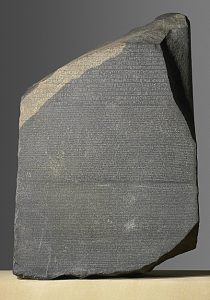Foi a Pedra de Rosetta (196 a.C.) que possibilitou decifrar os hieróglifos egípcios. Proeza conseguida por Jean-François Champollion (1790-1832).
A parte central do site é uma análise linguística integral do texto trilíngue sobre a Pedra de Rosetta. No entanto, ele também procura apresentar informações interessantes para um leitor não acadêmico.
Diz o site:
This homepage is the outcome of a hands-on university seminar on the online presentation of the Rosetta Stone. It is a cooperation of the German Excellence Cluster Topoi and the Department of Archaeology of the Humboldt-Universität zu Berlin. For this project, the project leaders and the seminar participants combined their expertise in Egyptology, Ancient Greek Linguistics, General Linguistics, and Computer Sciences. A kernel part of the homepage is a full linguistic analysis of the trilingual text on the Rosetta Stone. However, it also seeks to present interesting information for a non-academic reader. The homepage is still under development.
On the Rosetta Stone, an Ancient Egyptian decree from 196 BCE was inscribed in three versions, in three language varieties and scripts:
- Ptolemaic Neo-Middle Egyptian in hieroglyphic script (top section),
- Demotic Egyptian in Demotic script (middle section),
- Koine Greek language in Greek script (bottom section).
This type of artefact is called a trilingual. The Rosetta Stone played a crucial role in the famous decipherment of the hieroglyphic script by Jean-François Champollion (see the BBC documentary The Mystery of the Rosetta Stone).
A Pedra de Rosetta desempenhou um papel crucial na famosa decifração da escrita hieroglífica por Jean-François Champollion (veja o documentário da BBC, The Mystery of the Rosetta Stone).
Leia também, sobre a Pedra de Rosetta, aqui (em espanhol) e aqui (em português).